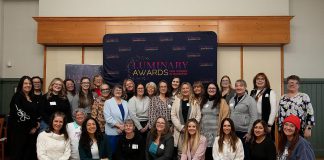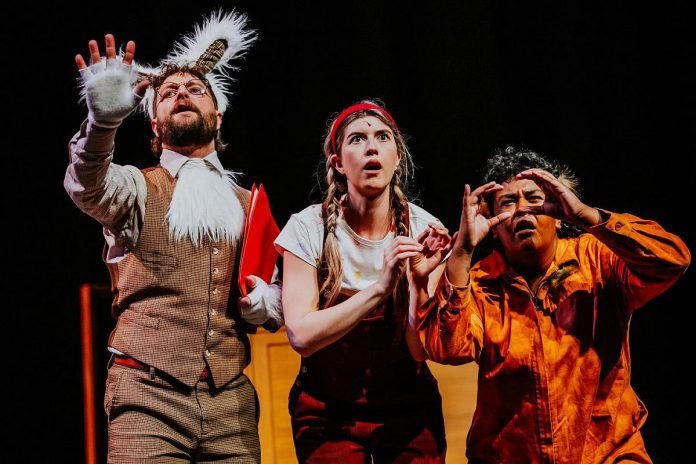
Brave are those who mess with an already good thing. Since Lewis Carroll published his children’s novel Alice’s Adventures in Wonderland in 1865, it has been a very good thing indeed.
The story of the young girl who falls through a rabbit hole and subsequently encounters a bevy of fantasy world characters has never been out of print and has been translated into 174 languages. Countless adaptations of the story for radio broadcast, the big screen, and the stage have furthered its enduring appeal as one of the popular fantasy stories ever penned.
Any live theatre presenter would be wise to bring Alice et al to life as it was originally written. But since its founding in 2015, Toronto-based Bad Hats Theatre has pushed the boundaries, the result being the staging of exciting and thought-provoking new takes on classic stories. So it was that the temptation to inject new life into Carroll’s timeless tale proved too strong.
Adapted by Bad Hats co-founder and artistic director Fiona Sauder, Alice In Wonderland opens on Friday, May 16 at Port Hope’s Capitol Theatre, with 18 stagings to follow.
Billed as a “musical reimagining” of the popular story, with music by Landon Doak and Victor Pokinko, it was staged to terrific reviews and sold-out audiences at Toronto’s Soulpepper Theatre on its way to winning six coveted Dora Mavor Moore Awards in 2023, including Outstanding New Musical.
Now Alice In Wonderland is on the road, with the first performances in the Kawarthas at the Capitol Theatre from May 16 to June 1, followed by a July 9 to 20 run at the Bancroft Village Playhouse. The tour opened on April 25 at the Sudbury Theatre Centre, where Sauder took a break before opening night to chat with kawarthaNOW about the production.
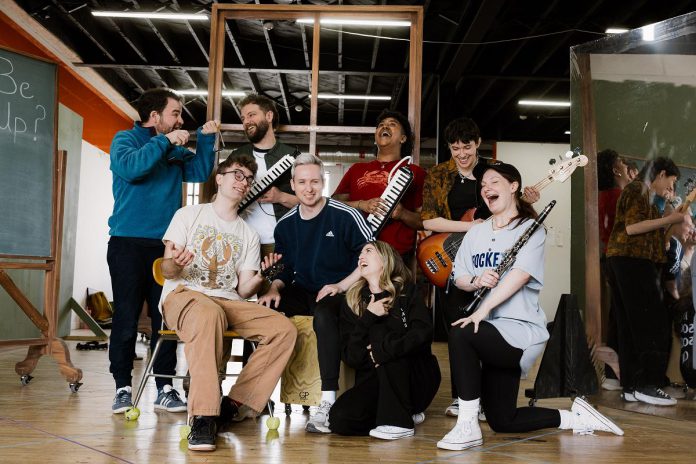
“One of the favourite parts of my job is the process of adaptation,” says Sauder.
“You can take these old stories that have lived on in our imaginations, and in our homes as we passed them onto our kids, and look and analyze them and ask yourself ‘What makes this a lasting story and what feels out of date?’ or ‘What isn’t as relevant to the creators or to the world we’re in right now?’ The reimagining was really an effort to contemporize the story and bring it in to today.”
“When you read the book, you follow a girl who basically arrives in many different places and is told there’s a certain set of rules in each place. She doesn’t fit in, or doesn’t understand (the rules), and then she leaves and goes somewhere else. This repetitive pattern, to us — the cornerstone of it — is about a person encountering the world and wondering why it is the way that it is. Why do we do out taxes at this time of year? Why do we have fitted sheets and also top sheets? Why is two plus two four?”
Sauder explains how she modernized the story for contemporary audiences.
“We made Alice an adolescent young girl peeking into adulthood, and realizing there are right and wrong answers to everything Alice does. Whereas when we’re a bit younger, we’re welcome to imagine it, being curious about everything. Alice, in our version, is a girl who has been told that period of her life is over. It’s time to have the right answers to things and play by the rules, and take on the responsibility of becoming a person in the world.”
Sauder says her adaptation puts forward the notion that time “never really ends — we’re always emerging into a new stage of life, and therefore, a new stage of rule sets and ways of the world. Reimagining it meant drawing out the theme that we’re forever growing up, and that if we lose that curiosity we have when we’re young, we’ll be lost.”
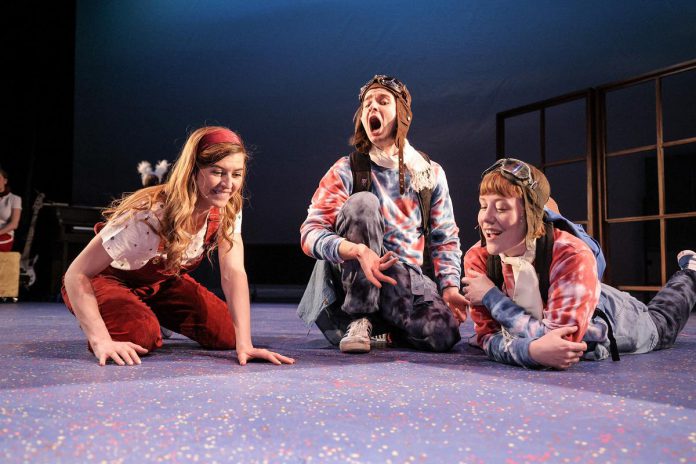
Having adapted a number of books into musicals, Sauder says Carroll’s story proved to be “the hardest one.”
“It’s so non-linear,” she points out. “To create a heroine’s journey is really difficult when it’s a piece that’s built in little chapters, each of which is kind of its own little universe.”
“It’s inspired by elements of the book, but we had to create our own rule set. What Alice’s reason for going to Wonderland is, and how it grows, and how she sets a goal that she does, or doesn’t, achieve. We created structure from something that has a ton of whimsy. It’s a hybrid of invention and adaptation.”
Speaking to the music, Sauder says the “whimsy” of Wonderland “really allowed them (Doak and Pokinko) to play with a lot of different styles.”
“The show is about growth through time; at what time we’re supposed to be what kind of person and have what kinds of answers. There’s lots of different time signatures and styles of music. Anything goes in Wonderland. We kind of tried everything first and then refined it.”
To anyone who sees Bad Hats Theatre’s alterations to the original story as a bad thing, Sauder makes it clear “We’re not trying to correct anything that’s wrong. We’re trying to pay homage to it.”
“I think of it as when you hear a song that you really, really love, and then you hear a cover of it and you go ‘Gosh, this is a great tune.’ You still know it’s a fantastic piece of writing. You hear it in a little bit of a different light. It’s honouring — it’s not undoing what the book got right.”
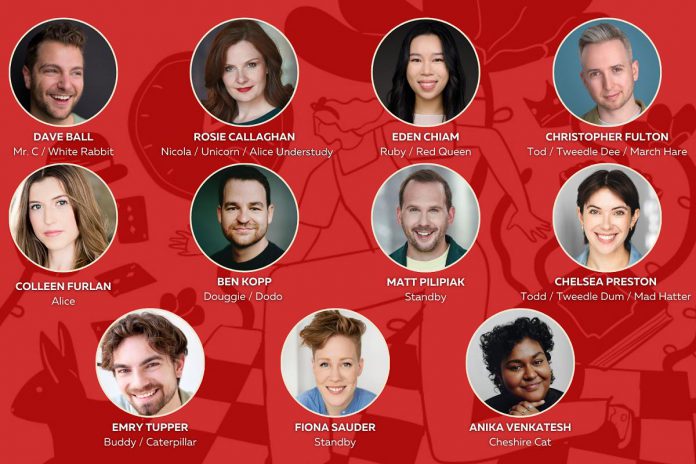
Directed by Sue Miner, the touring cast features Colleen Furlan in the title role with the remaining cast of eight playing multiple roles: Dave Ball as Mr C. and the White Rabbit, Rosie Callaghan as Nicola and the Unicorn, Eden Chiam as Ruby and the Red Queen, Chris Fulton as Tod, Tweedle Dee, and the March Hare, Ben Kopp as Douggie and the Dodo, Chelsea Preston as Todd, Tweedle Dum, and the Mad Hatter, Emry Tupper as Buddy and the Caterpillar, and Anika Venkatesh as the Cheshire Cat.
Speaking to the cast, Sauder notes what’s “especially cool is the cast is also the band. Everybody plays not only multiple roles but also multiple instruments. There’s never a dull moment; the artists on stage are very, very busy, not least of all Colleen who plays Alice.”
“She’s a fantastic performer whom we encountered in Winnipeg when we were doing our premiere of the show. We brought her on to stand in for the girl who was playing Alice because there was some illness in the cast. The original Alice had to go home to Toronto. Colleen stepped in and we fell absolutely in love with her.”
“She’s a physical and emotional athlete, and that’s what this role requires. She never leaves the stage for about an hour-and-a-half (the production runs 80 minutes with no intermission). Colleen has built an incredibly beautiful nuanced performance of that feeling of being so excited about what’s next in the world for her, and also so terrified and confused — the feeling of being on the precipice of something.”
The awards and critical acclaim that have come the production’s way, with The Toronto Star hailing it as “nothing short of a delight” and giving it four out of four stars, are a welcome byproduct of the many hours put in by all involved with the production, says Sauder.
“We were nominated for 13 (Dora Mavor Moore Awards),” she says. “The Hobbit had 15 (nominations) one year, so we were close to the record. It was incredibly validating. These shows take so long to get right.”
“It feels like it’s our job to bring stories to people. Those stories come with joy and catharsis. When I ask myself what I can give to the world, the thing that I can contribute right now is storytelling that asks people to sit together and feel together. Musicals are especially good at that.”
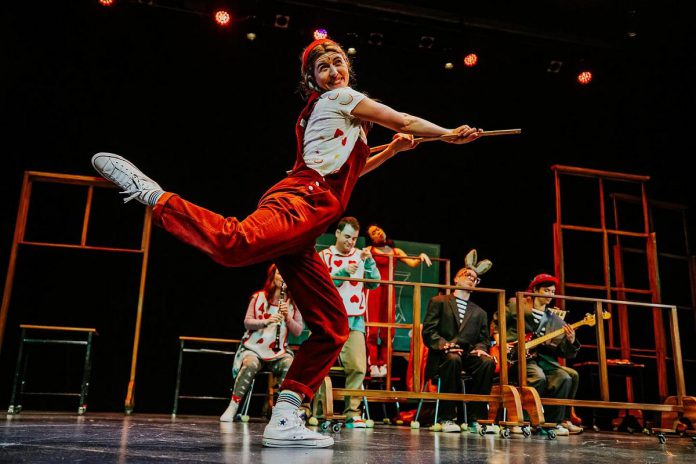
“In our adaptation of Alice, we start in a world that we know, a classroom, and then we flip it upside down,” Sauder explains. “Everything in Wonderland is a reflection of the world that we’re in. That’s a lot of what theatre’s superpower is: helping us understand parts of the world by putting them into story.”
“Sitting in the audience, you can decide which parts are about you, which are the parts you’re learning from, and which are the parts that challenge you. You get to have a really individualized experience. It asks people to be present; to think about themselves and their sense of self. A lot of people, of every age, come out of it feeling they’ve seen a play about them.”
Sauder is delighted to be returning to the Capitol Theatre, where she directed the Capitol’s production of the musical A Year with Frog and Toad last spring, to present Alice in Wonderland.
“It feels like this play really invites people to go to a magical place, and I think that’s a great way to start a series of invitations (to Capitol shows) — to go down the rabbit hole into a season of adventure and storytelling and music and togetherness. It’s cool to come back with my ragtag crew of hooligans.”
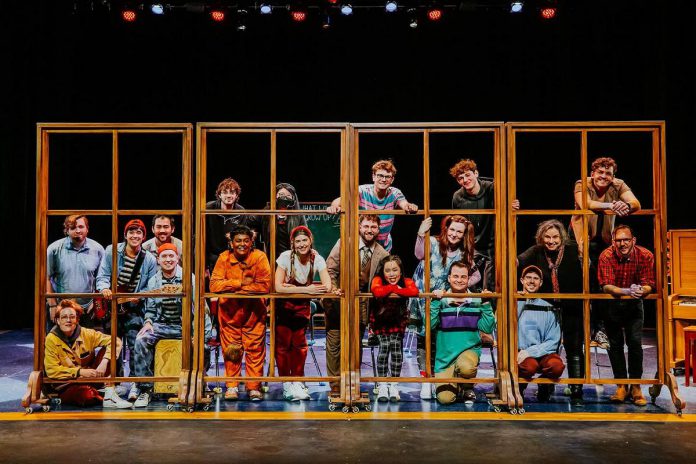
Given that Alice in Wonderland is a family musical, the Capitol Theatre is presenting multiple evening and matinee performances to give everyone a chance to experience it. The play runs at 7:30 p.m. on May 16 and 17, May 23 and 24, and May 29 to 31, at 10:30 a.m. from May 20 to 22 and May 27 to 29, and at 2 p.m. on May 18, 24, 25 (a relaxed performance), and 31, and June 1.
Following the evening performances on May 22 and 29, the Capitol is hosting “Talk Back Thursdays” featuring a free Q&A with the artists where you can find out more about the process of making live theatre.
Other than the pay-what-you-can preview on May 16, tickets are $48 for adults, $40 for ages 13 to 30, and $22 for ages 12 and under, and are available at the Capitol Theatre’s box office in person at 20 Queen Street (10 a.m. to 4 p.m. Tuesday through Saturday), by phone at 905-885-1071, or online at capitoltheatre.com.

























